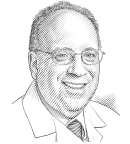GUEST EDITOR
Geriatrics for the Oncologist is guest edited by Stuart
Lichtman, MD, and developed in collaboration with the International Society of Geriatric Oncology (SIOG). Dr. Lichtman is an Attending Physician at Memorial Sloan Kettering Cancer Center, Commack, New York, and Professor of Medicine at Weill Cornell Medical College, New York. He is also President Elect of SIOG. For more information about geriatric oncology visit www.siog.org and the new ASCO Geriatric Oncology website (www.asco.org/practice-guidelines/cancer-care-initiatives/geriatric-oncology/geriatric-oncology-resources).
Asia is currently experiencing an unprecedented rate of growth in its aging population. This “silver tsunami” has translated into a burgeoning number of older patients with cancer, as cancer is a disease of aging. However, unlike their Western counterparts, elderly patients with cancer in Asia are much less likely to receive cancer treatment, due to cultural influences and a stigma associated with cancer care.
Many Asian elderly patients with cancer belong to extended families and depend on their family members to make treatment decisions for them. This cultural uniqueness, compounded by preconceived notions about excessive toxicities related to cancer treatment, has led to lower cancer treatment acceptance rates in Asia compared to equivalent Western counterparts. These cultural influences on elderly Asian patients with cancer form a big barrier to the provision of appropriate cancer care.
Role of Traditional Medicine
Another big hurdle faced by oncologists treating Asian patients comes in the form of alternative therapies like traditional Chinese medication, Ayurveda (Indian traditional medicine), and other similar practices seen in many Asian cultures. A recent study among more than 800 patients with cancer from 9 large cancer hospitals in China found that 45% of these patients took traditional Chinese medication together with their cancer medications.1 This reflects the faith of the local population in alternative therapies as adjunctive treatments to be taken together with Western medicine.

Stuart Lichtman, MD
In Singapore (as in many other parts of Asia), it is common for patients to reject evidence-based cancer treatment and to try traditional therapies, which they deem to be safer and just as efficacious, even if there is little to no evidence to support this notion. The pervasive influence of the use of traditional medications in these parts has led to a rapidly growing interest in conducting proper scientific studies of these traditional medications in many Asian countries. Perhaps with more data on the benefits, side effects, and potential for treatment interaction, elderly cancer patients in Asia will be able to make more informed treatment decisions in the future.
Rise of Geriatric Oncology in Asia
These challenges have made the need for specialized care for these patients an important agenda item in the minds of many Asian oncologists. Taking the cue from oncologists in North America and Europe, the field of geriatric oncology has slowly come to the forefront of oncology care in a number of Asian countries.
In Singapore, for example—where more than one-third of all mortality is due to cancer—a formal geriatric oncology program was initiated at the National Cancer Centre Singapore (NCCS) in 2007 and has now grown into a full-fledged clinical service that serves more than 250 elderly cancer patients per year. With over 60% of all cancer patients in the country aged over 65 years, the focus on specialized care for this group has now extended to include geriatric oncology training for oncology nurses and family physicians in the community. Geriatric oncology workshops are held yearly for nurses, family physicians, and allied health professionals to provide them with insights on how best to treat these patients in clinical practice. Geriatric oncology has also been incorporated into the medical oncology fellowship training program at the NCCS.

There is still much to be done for elderly Asian oncology patients. With a dearth of data on their current status and even less known about their treatment choices, there lies a big knowledge gap, which, in turn, presents a wonderful opportunity for research in this special group of patients living in the world’s most populous continent.— Ravindran Kanesvaran, MD
Tweet this quote
Many other Asian countries, including Japan and Korea, have formalized geriatric oncology programs as well. Oncologists from the two most populous countries in the world, China and India, have also shown great interest in the field, with many of their oncologists taking the initiative to set up services in their respective countries.
One big driver of the rapidly developing interest in geriatric oncology has been the expansion of activities developed by the International Society of Geriatric Oncology (SIOG) in Asia. The first of them was the inaugural SIOG Asia Pacific conference, which was held in Kuching, Malaysia, in 2011 and drew over 300 delegates.
This was followed by the second SIOG Asia Pacific conference in Singapore in 2014. The stellar international faculty from SIOG drew great interest, with participation from about 14 Asian countries. With many other geriatric oncology educational programs in the pipeline in Asia, interest in and development of this field will continue to grow.
Closing Thoughts
Looking ahead, there is still much to be done for elderly Asian oncology patients. With a dearth of data on their current status and even less known about their treatment choices, there lies a big knowledge gap, which, in turn, presents a wonderful opportunity for research in this special group of patients living in the world’s most populous continent. ■
Disclosure: Dr. Kanesvaran is the national representative for Singapore in SIOG and the President of the Singapore Society of Oncology.
Reference

